Bidsketch Alternatives
Explore 10 alternatives to Bidsketch. This guide compares proposal software on features, pricing, and use cases to help you choose.

Bidsketch is a popular tool for a reason. It helps create professional proposals quickly with time-saving templates and e-signature features. Many freelancers and agencies use it to send contracts to clients without delay.
But like any tool, it has limits. Some users report an outdated interface and a lack of integrations. To help you find a better fit, we analyzed the top alternatives to Bidsketch, comparing their pros and cons based on G2 reviews. Let's get started.
Before You Choose: Consider 11x
For teams that want to use digital workers in their sales process, 11x is an option. It provides autonomous agents for specific sales tasks, which can help expand your team's operational reach.
11x is an all-in-one GTM platform where our AI agents manage the sales process. Alice finds prospects and runs outreach; Julian qualifies inbound leads and books meetings. We consolidate tools for data enrichment, outreach, and email warmup, removing the need for separate point solutions.
Bidsketch Alternatives
The following section provides a detailed review of each alternative. We analyze their pricing, features, and specific advantages and drawbacks relative to Bidsketch to help you find the right fit.
1) Proposify
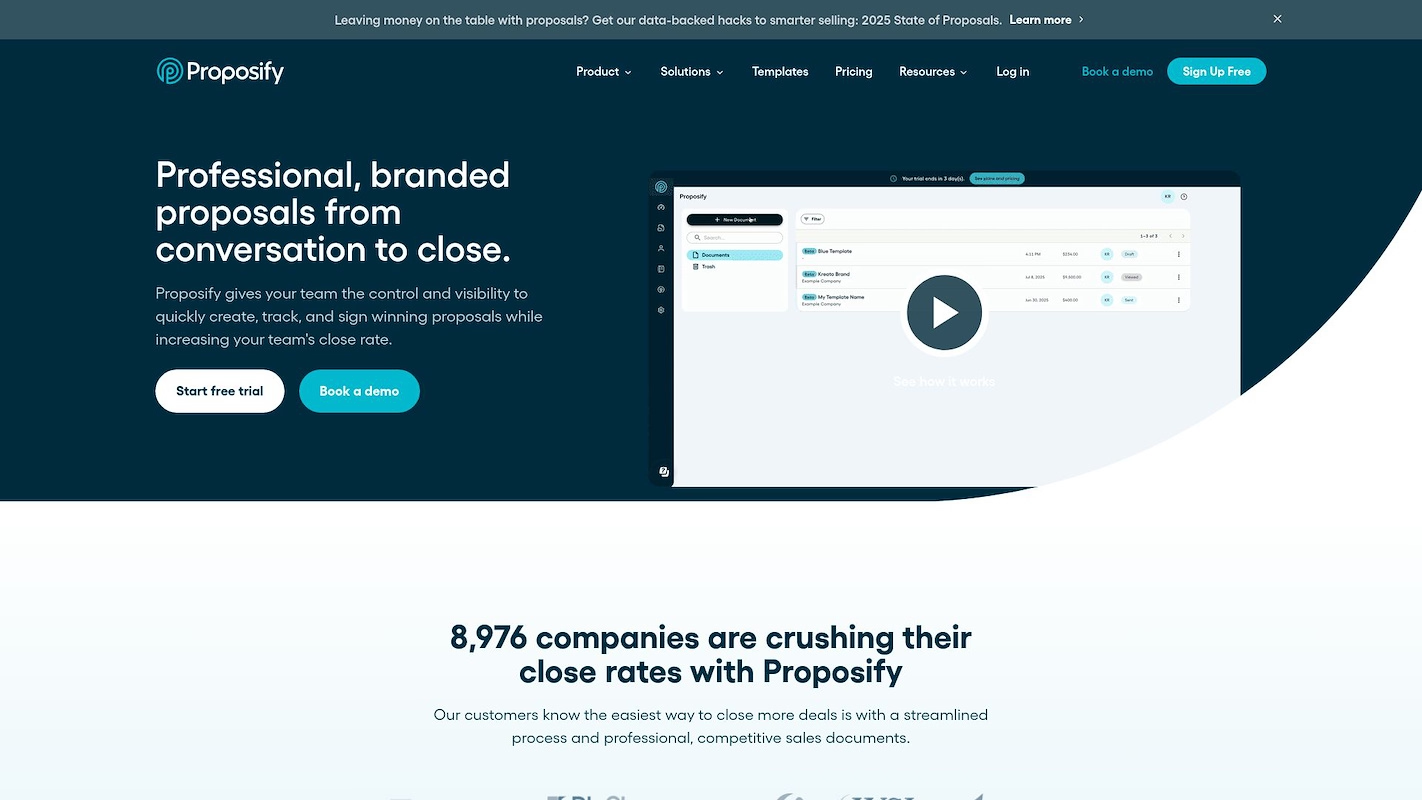
Proposify is a cloud-based platform for proposal management and document automation. It allows sales teams to create, send, track, and e-sign sales documents like proposals, quotes, and contracts. The software centralizes templates and offers real-time analytics on document engagement.
It is for B2B sales teams that use proposals or contracts to close deals and helps standardize document workflows across an organization.
Proposify's Main Features
- Offers integrated e-signatures and interactive quoting with quantity selectors, optional add-ons, and Stripe payments.
- Provides automated workflows with AI-assisted content, approval rules, auto-reminders, and role-based permissions.
- Includes real-time tracking and analytics, with open notifications and data on time spent per document section.
- Supports native and API integrations with CRMs and tools like HubSpot, Salesforce, Zoho, and Pipedrive.
How Proposify Compares to Bidsketch
Average Review Score: 4.6/5 stars based on 1,122 G2 reviews.
- Proposify offers more integration options, including native connections with CRMs like HubSpot and Salesforce. This is different from Bidsketch, which has fewer integration capabilities.
- It provides detailed engagement tracking that shows how much time clients spend on each section of a proposal. This level of analytics is more advanced compared to Bidsketch's features.
- The tool allows for interactive quotes where clients can select options and make payments directly through Stripe. This feature is not available in Bidsketch, which has a more static proposal format.
- Unlike Bidsketch, Proposify supports complex approval workflows and role-based permissions. This helps larger teams manage document creation and maintain consistency across proposals.
Proposify's Drawbacks Compared to Bidsketch
- Some users find Proposify's editor difficult for minor formatting changes, unlike Bidsketch's simpler interface which allows for faster edits.
- The tool's templates can sometimes be restrictive, which makes highly custom designs a challenge. Bidsketch offers basic templates that are straightforward to populate without extensive design work.
- Its extensive features, while powerful, may introduce a learning curve for teams that need a simple tool. Bidsketch is more focused and therefore quicker to learn for basic proposal needs.
Pricing and Plan Comparison
Proposify's pricing is more competitive than Bidsketch's across comparable plans. The Basic plan costs $19 per user per month, while Bidsketch's Freelancer plan is $23 per month. This cost advantage extends to the mid-tier, with Proposify's Team plan at $41 versus Bidsketch's Studio plan at $47.
2) PandaDoc
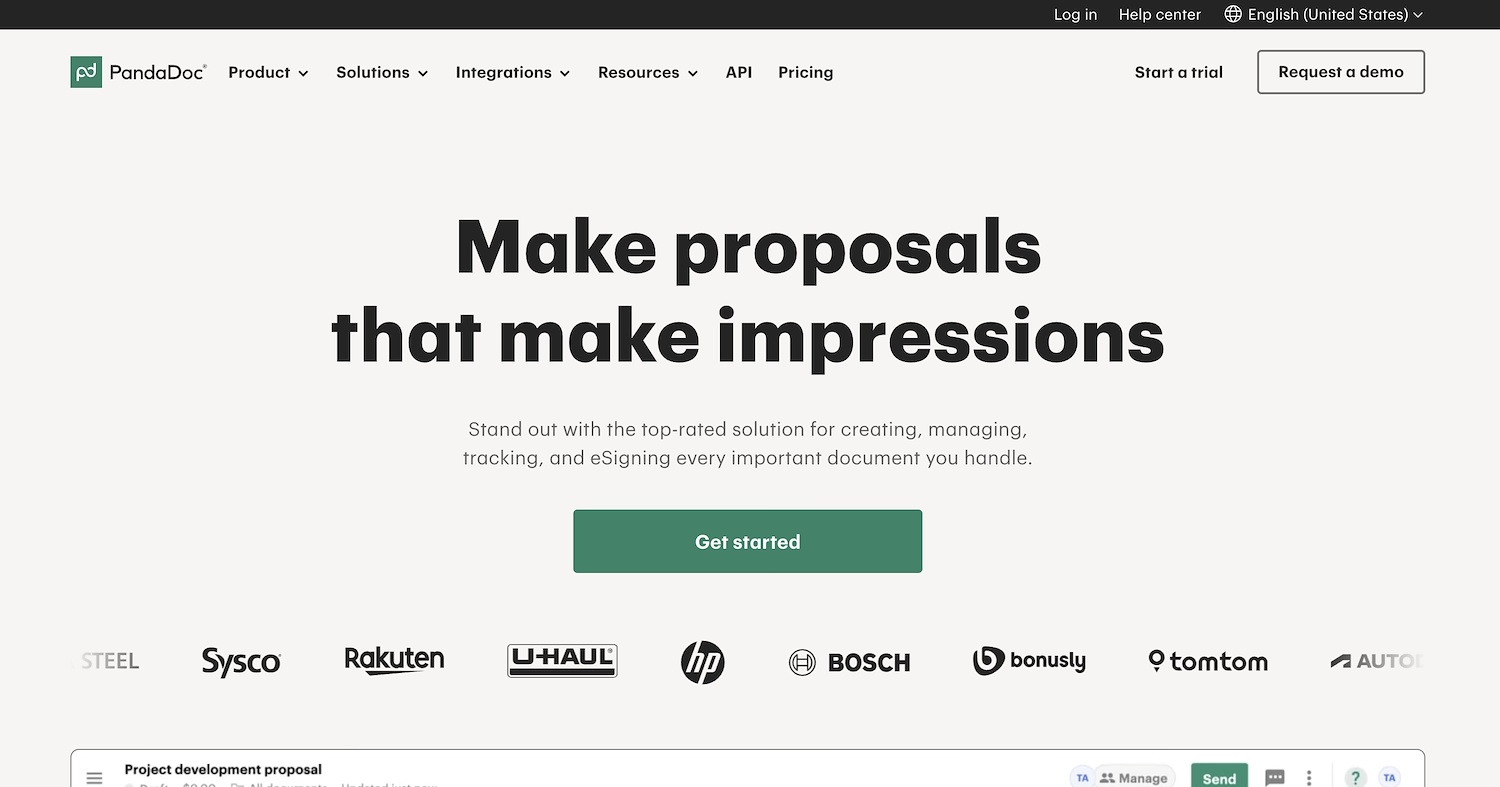
PandaDoc is an agreement-management platform for business documents. It covers the workflow from creation and sending to tracking, e-signature, and payment collection. Teams use it to create interactive sales proposals, quotes, and contracts.
The system helps finalize deals with accuracy and brand consistency, and it supports legal compliance. It is a tool for teams that need to manage the document lifecycle in one place.
PandaDoc's Main Features
- Generates automated quotes by pulling product-catalog data and applying pricing rules with a configure-price-quote (CPQ) system.
- Provides digital deal rooms, which are collaboration spaces for real-time commenting, redlining, and approvals.
- Uses rules-based smart content blocks that help eliminate manual errors during document creation.
- Supports immediate payment collection through embedded gateways like Stripe, Square, and PayPal, and offers over 700 integrations.
How PandaDoc Compares to Bidsketch
Average Review Score: 4.7/5 stars based on 2,893 G2 reviews.
- PandaDoc offers over 700 integrations, including payment gateways like Stripe and PayPal. This provides more connectivity options than Bidsketch, which has fewer integration capabilities.
- The tool includes a configure-price-quote (CPQ) system to automate quote generation from a product catalog. This differs from Bidsketch, where proposals are more static and require manual price entry.
- It provides digital deal rooms that support real-time collaboration, comments, and document redlines. Bidsketch does not have a comparable feature for direct client and team interaction on a document.
- This platform manages the full document lifecycle, including creation, e-signature, and notarization. Its scope is broader than Bidsketch, which focuses mainly on the proposal process.
PandaDoc's Drawbacks Compared To Bidsketch
The platform's all-in-one nature can be overwhelming for teams that only need proposal software. Bidsketch offers a more focused toolset, which simplifies the workflow for users with singular proposal needs.
Some users note that PandaDoc's editor can feel complex for simple text or formatting adjustments. In contrast, Bidsketch has a more basic interface that allows for faster, more direct edits to proposal content.
A few users report occasional glitches with the e-signature feature, which might delay document finalization. Bidsketch provides a core e-signature function built for its specific proposal workflow.
Pricing and Plan Comparison
PandaDoc’s entry-level Essentials plan is more affordable at $19 per month compared to Bidsketch’s Freelancer plan at $23 per month. For mid-tier needs, Bidsketch’s Studio plan at $47 per month is slightly less expensive than PandaDoc’s Business plan at $49 per month. For detailed pricing, visit PandaDoc's official website.
3) Qwilr

Qwilr is a sales-proposal platform that turns documents into interactive, mobile-friendly web pages. Sales teams create and track proposals, quotes, and agreements from their CRM. The workflow supports e-signatures, payment collection, and document automation. It also provides digital sales rooms for deals.
Qwilr's Main Features
- It converts static documents into interactive and mobile-friendly web pages.
- The platform provides interactive quotes with line-item, quantity, and pricing selectors tailored to each buyer.
- A dedicated API allows developers to generate proposals programmatically.
- The tool offers document security features like password protection and version control through a live link.
How Qwilr Compares to Bidsketch
Average Review Score: 4.6/5 stars based on 802 G2 reviews.
- Qwilr turns proposals into interactive web pages, unlike the more static document format used by Bidsketch.
- It lets clients interact with quotes, select options, and add services directly on the page, a feature not found in Bidsketch's static proposals.
- The platform includes a developer API to create documents programmatically, which is an advanced option that Bidsketch does not have.
- Its analytics show which parts of a proposal a client views, which gives more detailed insight than the data from Bidsketch.
- The tool secures documents with password protection and uses a live link for version control, a different method than Bidsketch's workflow.
Qwilr's Drawbacks Compared to Bidsketch
- Some users find that Qwilr's web-page format can be restrictive for specific layouts. In contrast, Bidsketch offers a more direct document editor that allows for quick, simple formatting adjustments without needing advanced design skills.
- The tool's focus on creating interactive web pages might introduce a learning curve for teams that need a simple proposal tool. Bidsketch, with its more focused feature set, is often quicker for new users to learn.
- While Qwilr's templates create visually appealing pages, they sometimes offer less flexibility for unique designs. Bidsketch provides basic templates that are simpler to populate, which can be faster for teams without extensive customization needs.
Pricing and Plan Comparison
Qwilr's Business plan starts at $35 per user per month, making its entry point more expensive than Bidsketch's Freelancer plan at $23 per month. However, Qwilr is more affordable than Bidsketch's mid-tier Studio plan, which costs $47 per month. For detailed pricing, visit Qwilr's official website.
4) Better Proposals
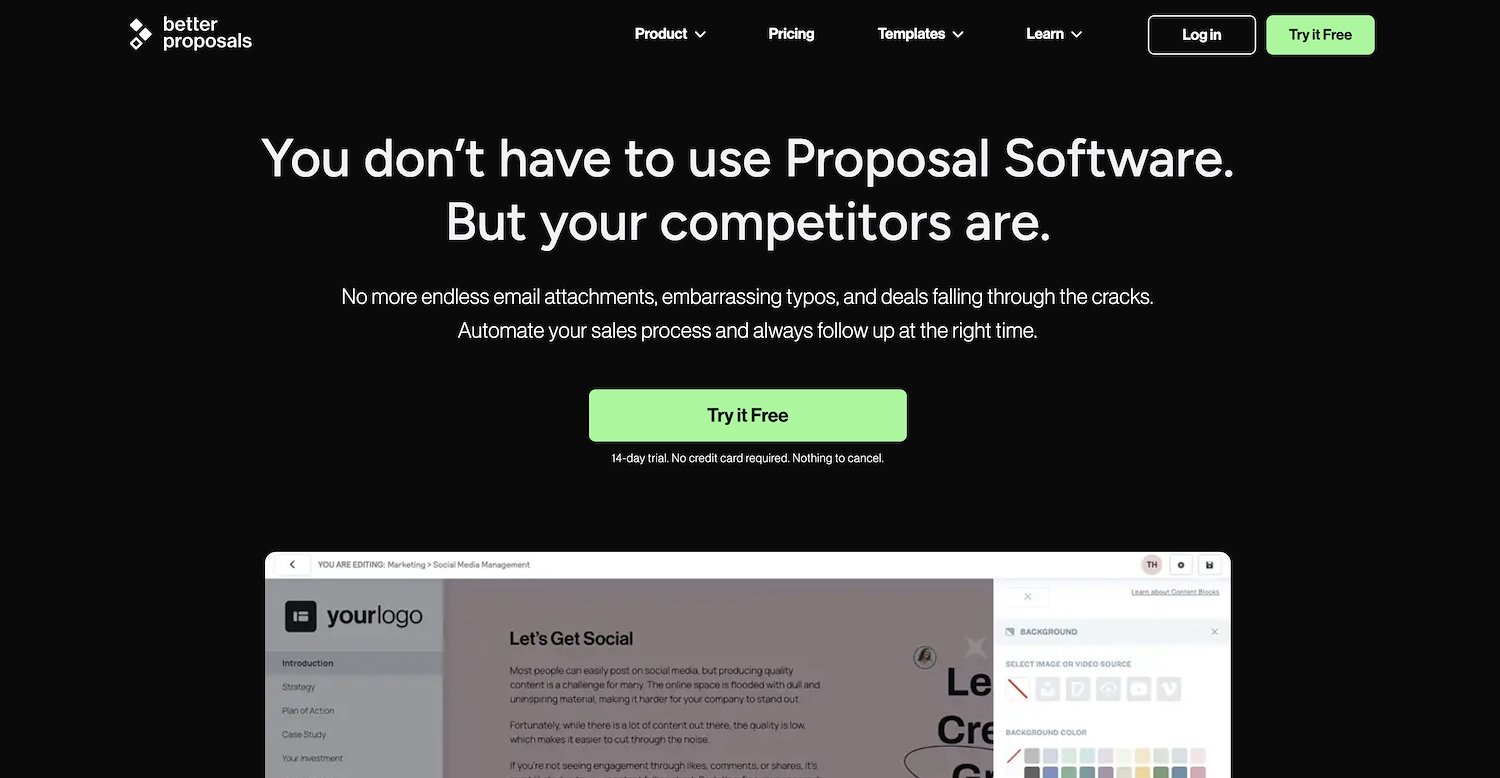
Better Proposals is a platform for sales teams to create, send, and track business proposals. The software generates web-based documents and includes analytics and e-signature functions. Its focus is the management of the proposal stage within a sales deal.
The system provides a template library and payment processor integrations. This supports the sales cycle from the first document to final payment.
Better Proposals's Main Features
- Creates post-signature workflows to collect payments, schedule calls, and gather information.
- Includes a built-in live chat function within proposals for real-time communication.
- Imports existing Word documents directly into its template system.
- Provides 24/7 live human support with an average two-minute response time.
How Better Proposals Compares to Bidsketch
Average Review Score: 4.3/5 stars based on 48 G2 reviews.
- Better Proposals includes a live chat function inside its documents for real-time client communication. This feature is not available in Bidsketch, which requires communication outside the platform.
- The tool connects with over 50 other platforms, including payment gateways like Stripe and PayPal. This offers more integration options compared to Bidsketch, which has limited connectivity.
- It offers post-signature workflows that help collect payments or schedule calls automatically after a client signs. Bidsketch's process, in contrast, concludes with the e-signature.
- This platform allows users to import existing Word documents directly into its template system. This is different from Bidsketch, where content is typically created within the platform's editor.
Better Proposals's Drawbacks Compared to Bidsketch
- Some users report that the editor can feel clunky for minor text changes. In comparison, Bidsketch has a simpler interface that allows for faster, more direct edits to content.
- Its feature for importing existing documents sometimes causes formatting errors. This is different from Bidsketch, where users build proposals inside a more controlled and basic editor.
- The platform's template system, while extensive, may feel restrictive for highly custom layouts. Bidsketch offers basic templates that are more straightforward to populate for simple proposal needs.
Pricing and Plan Comparison
Better Proposals offers a more affordable entry point with its Starter plan at $19 per month, compared to Bidsketch's Freelancer plan at $23 per month. However, Bidsketch is slightly more cost-effective at the mid-tier, with its Studio plan at $47 per month versus Better Proposals' Premium plan at $49 per month.
5) QuoteWerks
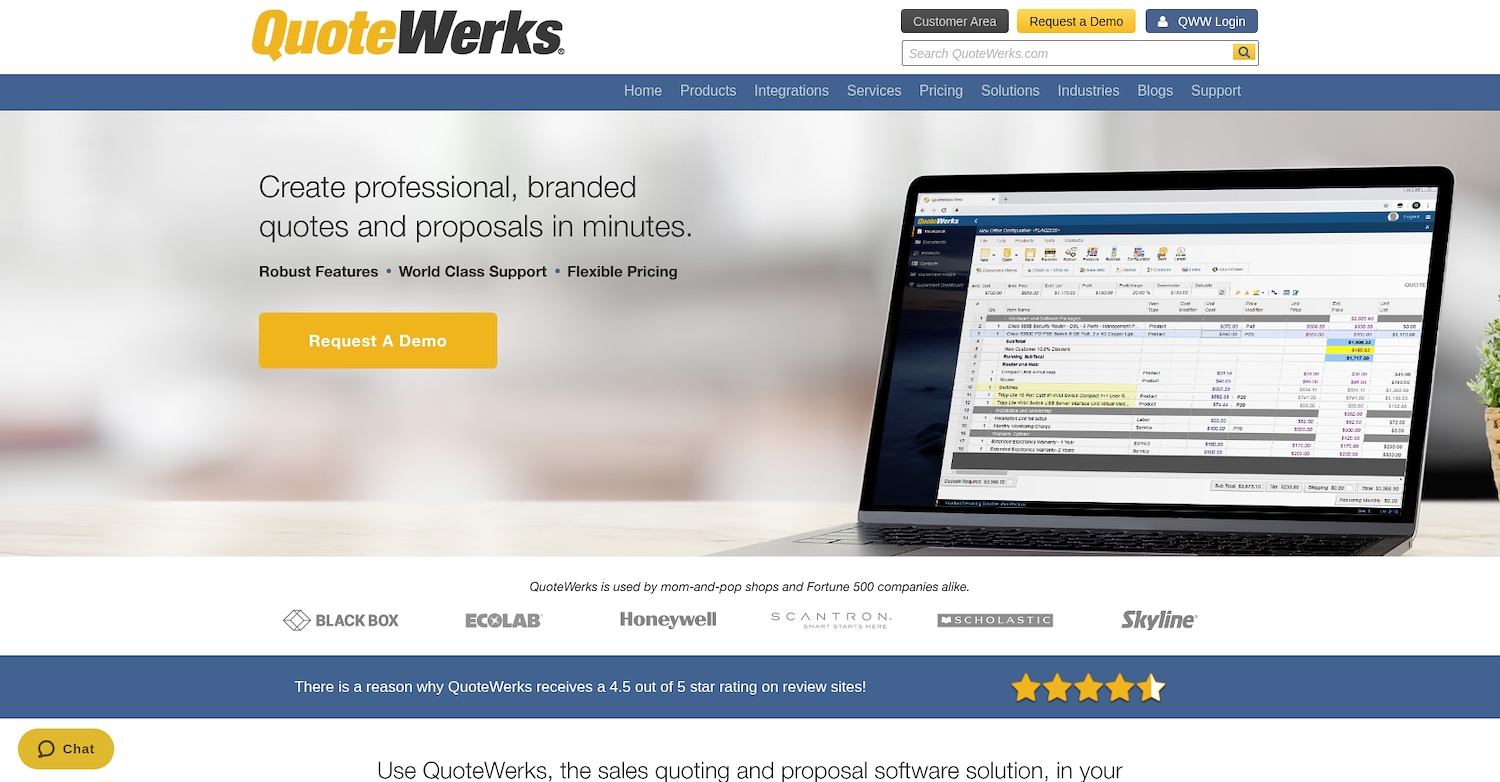
QuoteWerks is a sales quote and proposal platform for companies of any size. It automates the sales process, from quote creation to procurement, and is not specific to any single industry. The software connects with CRM, PSA, and accounting tools like Salesforce and QuickBooks.
Sales teams use it to manage the entire quote and proposal workflow.
QuoteWerks's Main Features
- It provides a guided configure-price-quote (CPQ) engine with item lists and templates to standardize pricing workflows.
- The platform supports bi-directional integrations with over 115 systems, including CRM, accounting, and distributor tools.
- It collects credit card and ACH payments for deposits or full balances through more than 80 integrated payment gateways.
- The software includes purchasing, procurement, and receiving modules to manage the post-quote process.
How QuoteWerks Compares to Bidsketch
Average Review Score: 4.3/5 stars based on 182 G2 reviews.
- QuoteWerks connects with over 115 systems, including CRM, accounting, and distributor tools. This is different from Bidsketch, which offers fewer integration options.
- The platform includes a configure-price-quote (CPQ) engine that guides sales reps through quote creation. This automates pricing, unlike Bidsketch's more manual proposal format.
- It provides purchasing and procurement modules to manage the post-quote process. In comparison, Bidsketch's workflow primarily concludes with the e-signature.
- This tool supports payment collection through more than 80 integrated gateways. This offers more payment flexibility than what is available within Bidsketch.
QuoteWerks's Drawbacks Compared to Bidsketch
Some users report that the QuoteWerks interface feels outdated. This can make the software less intuitive compared to Bidsketch, which provides a more modern and straightforward user experience.
The tool includes extensive features like procurement management, which can be unnecessary for teams that only need to create proposals. Bidsketch offers a more focused toolset that simplifies the workflow for this specific task.
Its setup process can be more technical, as some users note complexity with server configurations. This is different from Bidsketch, a cloud-based tool designed for a quick start with no technical setup required.
Pricing and Plan Comparison
QuoteWerks offers a more affordable entry point with its Standard Edition starting at $15 per month, compared to Bidsketch's Freelancer plan at $23 per month. This cost advantage extends to its Professional ($21/month) and Corporate ($30/month) editions, both priced lower than Bidsketch's mid-tier Studio plan at $47 per month.
Consider 11x for Your Sales Team
For teams that want to use digital workers in sales, 11x provides autonomous agents for specific tasks. This approach can expand your team's capacity for outreach and lead qualification. Explore how 11x can support your sales process.
At 11x, we manage the sales process with AI agents. Alice finds accounts and runs outreach, while Julian qualifies leads and books meetings. Our platform consolidates data, outreach, and warmup tools, removing the need for separate solutions.
Book a demo to see our AI agents in action.
6) Nusii
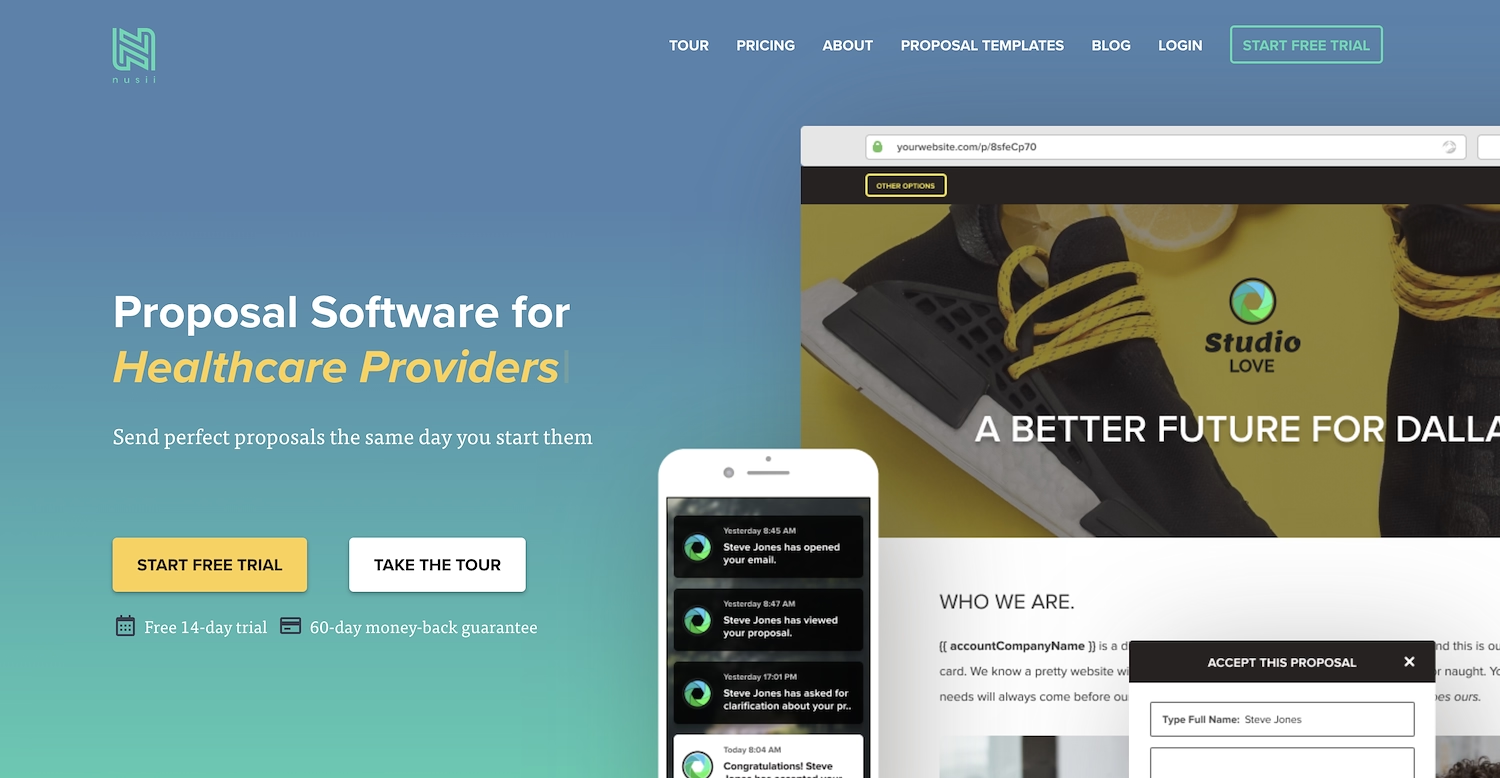
Nusii is proposal software to create and manage business documents. The platform allows users to send and track proposals, which can be secured with online signatures. It provides templates and analytics to help manage the sales document workflow from creation to client acceptance.
Nusii's Main Features
- Adds custom branding, logos, and colors to templates and uses a custom domain to hide third-party branding.
- Sends real-time alerts for proposal opens and views, with automated nudges for follow-ups.
- Saves reusable content blocks and uses dynamic variables to automatically insert client-specific data.
- Connects with tools like HubSpot and Stripe via native or Zapier integrations and includes a public REST API.
How Nusii Compares to Bidsketch
Average Review Score: 4.5/5 stars based on 24 G2 reviews.
- Nusii allows users to add custom branding, including logos, colors, and a custom domain. This offers a more tailored appearance than Bidsketch's standard proposal format.
- It saves reusable content blocks and uses dynamic variables for client-specific data. This differs from Bidsketch, where users manually enter information into templates.
- The tool connects with platforms like HubSpot and Stripe through native or Zapier integrations. This provides more connectivity options than Bidsketch, which has limited integration capabilities.
- This platform sends automated follow-up reminders for proposals that are not yet viewed. Bidsketch does not include this type of automated sales follow-up in its workflow.
Nusii's Drawbacks Compared To Bidsketch
Some users find the text editor has limited formatting controls. This is different from Bidsketch, which offers a more direct interface for quick content adjustments.
The platform's auto-save function can sometimes prevent users from undoing mistakes. This might be a workflow challenge compared to the more conventional editing process in Bidsketch.
Nusii's entry-level plan is more expensive than Bidsketch's comparable option. The starting price for Nusii is $29 per month, while Bidsketch's Freelancer plan costs $23 per month.
Pricing and Plan Comparison
Nusii is more expensive than Bidsketch across comparable plans. Its entry-level Freelance plan is $29 per month, while Bidsketch's is $23 per month. The mid-tier Studio plans are priced at $49 and $47 per month, respectively, giving Bidsketch a slight cost advantage.
7) Proposable
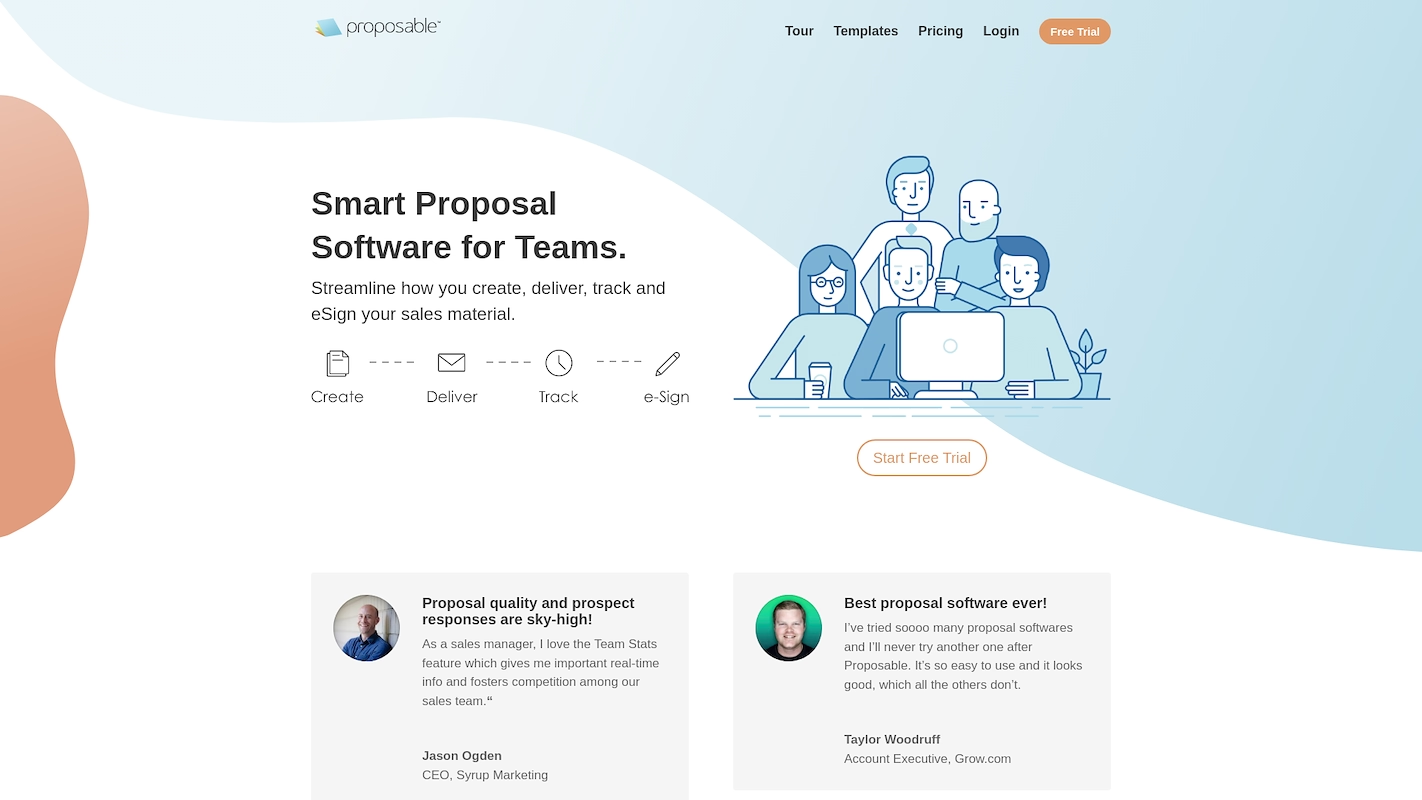
Proposable is a sales document platform that provides tools to create, deliver, and track proposals. The software focuses on the management of sales documents throughout the deal cycle.
It is for sales teams that need a system to handle the proposal process. The platform helps professionals monitor document engagement and manage their workflow from a central location.
Proposable's Main Features
- Embeds video and other rich media directly into proposal pages.
- Collects optional payments from recipients immediately after they accept and sign a proposal.
- Offers page-by-page analytics on recipient interaction and sends real-time email or text alerts for views, signatures, and payments.
- Includes role-based approval controls and allows users to @-mention teammates for collaboration on proposals.
How Proposable Compares to Bidsketch
Average Review Score: 4.2/5 stars based on 74 G2 reviews.
- Proposable allows users to embed video and other rich media directly into proposal pages. This differs from Bidsketch, which uses a more static document format.
- It provides page-by-page analytics and sends real-time text alerts for views and signatures. Bidsketch offers tracking, but without this specific level of granular, immediate notification.
- The tool includes collaboration features like @-mentions to tag teammates on proposals. This is a function not available in Bidsketch, where team communication occurs outside the document.
- Users can collect optional payments immediately after a client signs a proposal. In contrast, Bidsketch's workflow focuses on the proposal and signature stages without an integrated payment step.
Proposable's Drawbacks Compared To Bidsketch
Some users report that Proposable's editor can create formatting difficulties. This is different from Bidsketch, which offers a more basic interface for faster and more direct content edits.
The platform can sometimes experience slow performance. In contrast, Bidsketch's focused toolset is more lightweight, which often results in a quicker user experience for creating proposals.
Occasional platform downtime is a point some users mention. Bidsketch, with its simpler architecture, is generally noted for its reliability for the core task of proposal creation.
Pricing and Plan Comparison
Proposable offers a more affordable entry point with its Solo plan at $19 per month, compared to Bidsketch's Freelancer plan at $23 per month. This cost advantage continues with Proposable's Team plan at $39 per month, which is less expensive than Bidsketch's Studio plan at $47 per month.
8) GetAccept
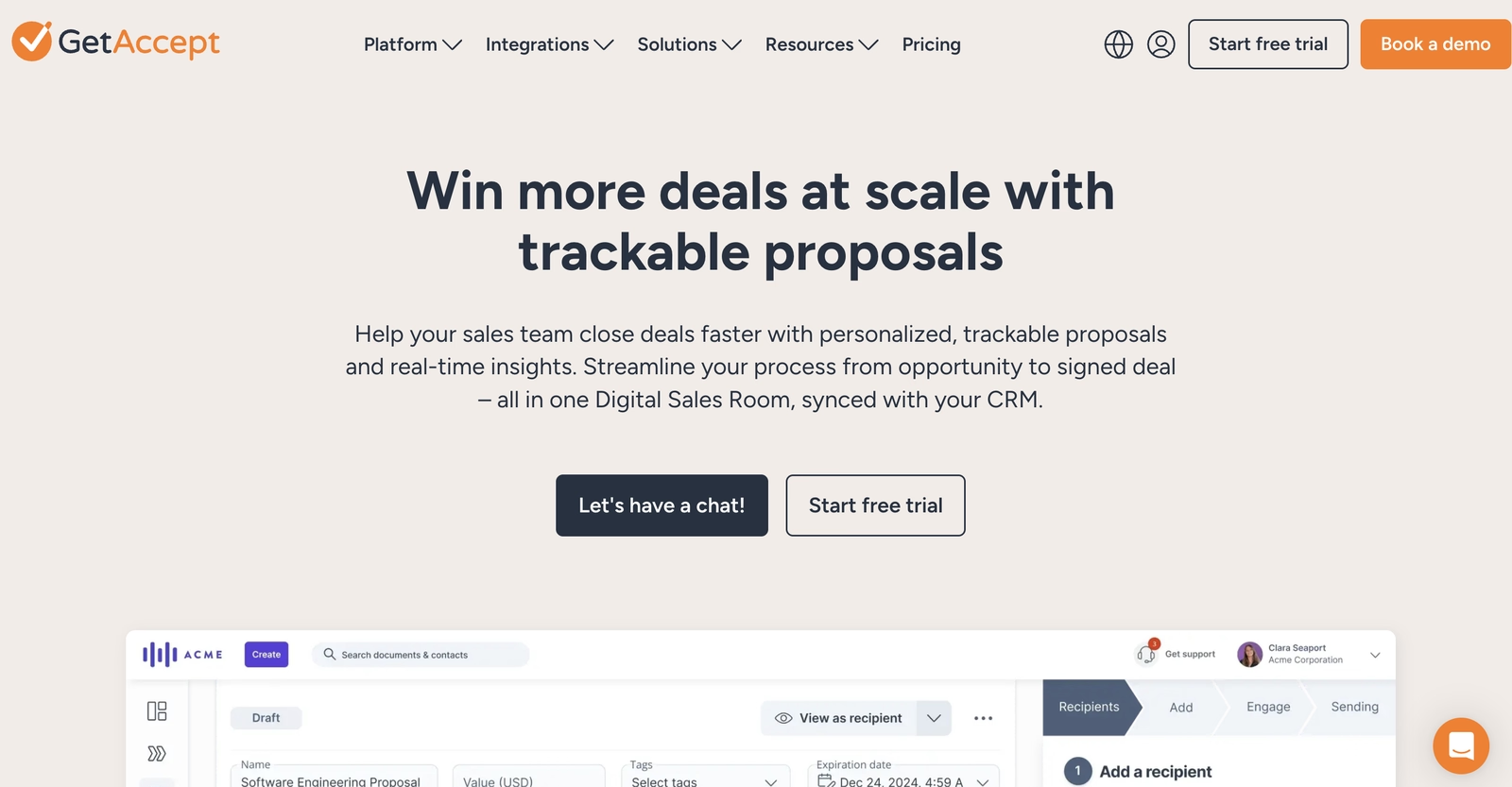
GetAccept is a sales platform for document management and digital sales rooms. It lets teams create, send, and track proposals and contracts. The system supports the deal cycle from the initial document to the final signature and subsequent contract management.
GetAccept's Main Features
- It provides user, role, and access management to control permissions within the platform.
- The system supports regulatory compliance and maintains a full signature history and audit trail.
- It sends automated reminders and sets expiration dates for documents to manage the signing process.
- The platform includes custom branding options and sends alerts and notifications for document activity.
How GetAccept Compares to Bidsketch
Average Review Score: 4.6/5 stars based on 1,023 G2 reviews.
- GetAccept provides digital sales rooms where teams and buyers can collaborate in real time. This is different from Bidsketch, which focuses on sending static proposal documents.
- The platform includes contract management features with a full audit trail for compliance. In comparison, Bidsketch's workflow primarily concludes after the e-signature.
- It offers user and role management to control permissions, which supports larger teams. This level of access control is not a main feature within Bidsketch.
- This tool sends automated reminders and allows users to set expiration dates on documents. Bidsketch does not have this type of automated follow-up system.
GetAccept's Drawbacks Compared To Bidsketch
GetAccept's all-in-one platform can be complex for teams that only need proposal software. Bidsketch offers a more focused toolset, which simplifies the workflow for users with singular proposal needs.
Some users report that the tool's templates offer limited flexibility for unique designs. This is different from Bidsketch, where basic templates are simpler to populate for teams without extensive customization needs.
Its entry-level plan costs $25 per month, which is slightly more than Bidsketch's starting plan at $23 per month. This might be a factor for freelancers or small teams on a tight budget.
Pricing and Plan Comparison
GetAccept's entry-level E-sign plan is $25 per month, slightly more than Bidsketch's Freelancer plan at $23 per month. For mid-tier needs, Bidsketch's Studio plan at $47 per month is also more affordable than GetAccept's Professional plan at $49 per month.
9) ClientPoint
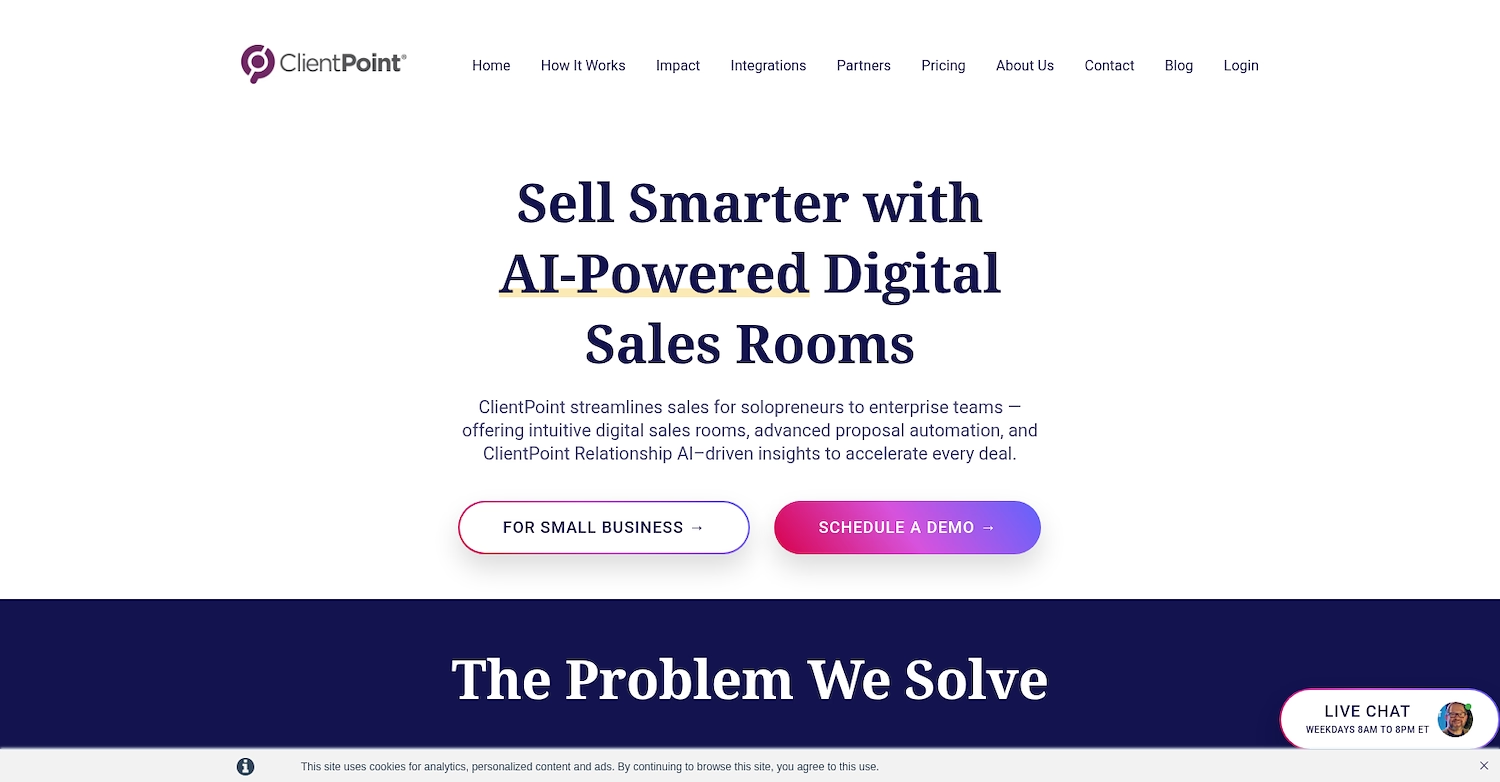
ClientPoint is a platform to manage client-facing documents. Sales teams use the software to create, send, and track proposals and other business materials. It provides a system to handle the document workflow within the sales process.
ClientPoint's Main Features
- Manages business relationship workspaces for scheduling meetings and sharing materials.
- Includes assembly and approval workflows to control document creation.
- Provides engagement tracking and proposal effectiveness reporting.
- Offers user, role, and access management for platform permissions.
How ClientPoint Compares to Bidsketch
Average Review Score: 4.5/5 stars based on 198 G2 reviews.
- ClientPoint provides business relationship workspaces to manage materials and schedule meetings. This is different from Bidsketch, which focuses only on the proposal stage.
- It supports the full client lifecycle, from marketing to customer onboarding. Bidsketch's workflow, in comparison, ends after the proposal is signed.
- The tool includes assembly and approval workflows with role-based access controls. This offers more control for larger teams than Bidsketch's simpler permission settings.
- The platform integrates with enterprise systems like Salesforce and Netsuite. This provides more connectivity options than Bidsketch, which has fewer native integrations.
ClientPoint's Drawbacks Compared to Bidsketch
- ClientPoint's extensive features can lead to a longer implementation time, which some reviews note takes around two months. This is different from Bidsketch, which is a more focused tool designed for a quick setup.
- Some users report that the platform can have slow performance and loading times. In comparison, Bidsketch offers a more lightweight experience because it focuses only on proposal creation.
- The tool's broad scope, which covers the entire client lifecycle, might be too complex for teams that only need to create proposals. Bidsketch provides a simpler, more direct workflow for just that task.
Pricing and Plan Comparison
ClientPoint does not publicly list its pricing, which suggests a focus on custom enterprise plans. This is different from Bidsketch’s transparent pricing tiers, which start at $23 per month. For accurate pricing details, we recommend visiting ClientPoint's official website.
10) RFPIO
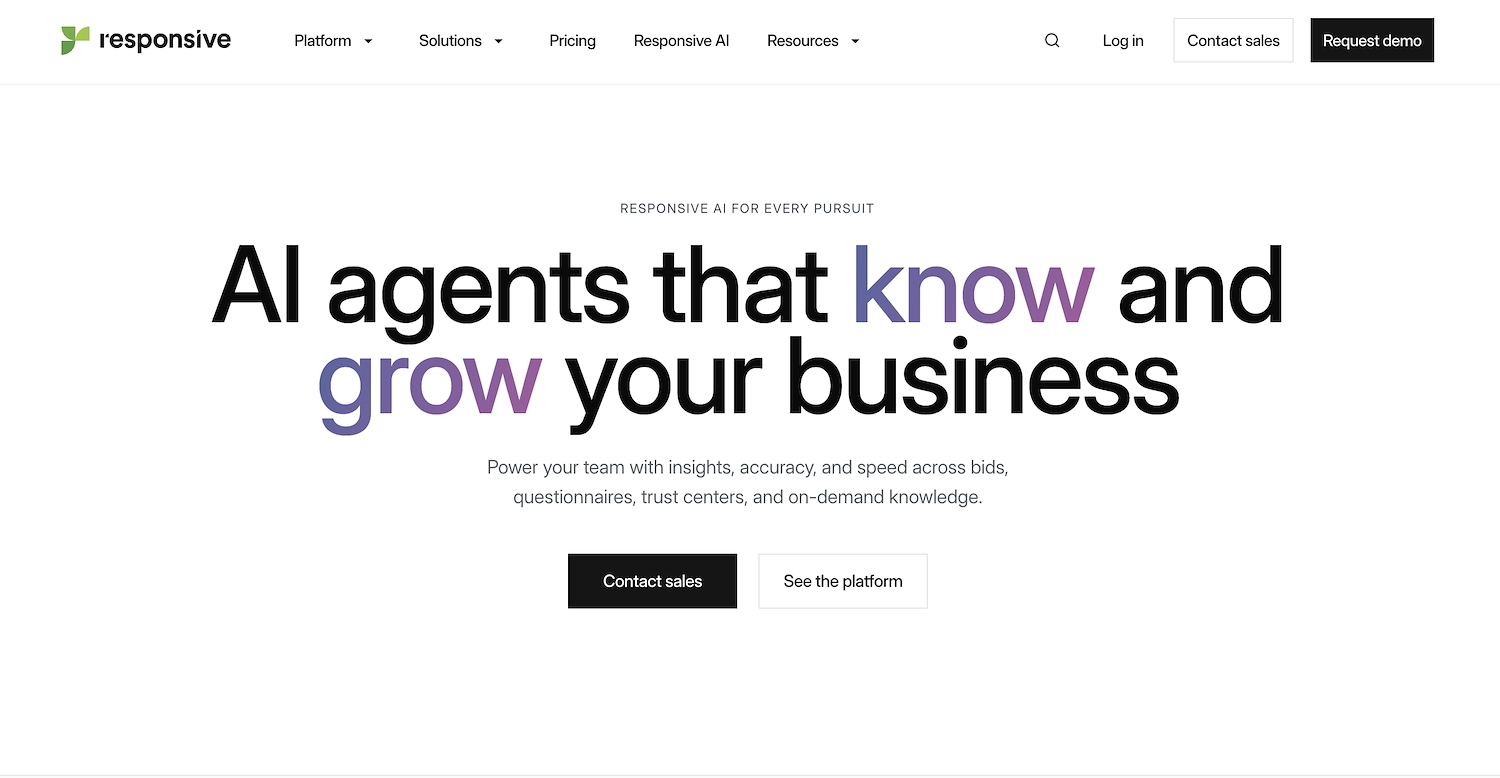
RFPIO is a response management platform for teams that answer requests for information, like RFPs and security questionnaires. It uses a central content library to organize company knowledge, which helps automate answers and supports team collaboration on responses.
The software is for organizations that handle a high volume of complex information requests and require a structured process.
RFPIO's Main Features
- It provides a questions library to store and organize approved content for quick reuse in information requests.
- The platform automates the generation of responses for various requests, including RFPs, RFIs, and security questionnaires.
- It includes collaborative creation tools and workflow management to handle complex response documents with multiple stakeholders.
- The software provides user, role, and access management to control permissions and platform administration.
How RFPIO Compares to Bidsketch
Average Review Score: 4.5/5 stars based on 1,162 G2 reviews.
- RFPIO automates responses for RFPs, RFIs, and security questionnaires. This is different from Bidsketch, which focuses on creating sales proposals.
- It uses a central questions library to store and reuse approved content. Bidsketch, in comparison, uses templates but lacks a dedicated knowledge repository.
- The tool includes collaborative creation tools for complex documents with multiple stakeholders. This is a more advanced workflow compared to Bidsketch's simpler proposal process.
- This platform provides user, role, and access management to control permissions. This offers more administrative control than the permissions available in Bidsketch.
RFPIO's Drawbacks Compared to Bidsketch
- RFPIO is designed for complex response management, such as RFPs. This focus makes it less direct for creating simple sales proposals, a task where Bidsketch specializes.
- Some users note the platform has a learning curve due to its extensive features. In comparison, Bidsketch provides a more focused toolset that is often quicker for new users to learn.
- The tool's pricing structure is typically aimed at enterprise clients and is not publicly listed. This is different from Bidsketch, which offers transparent pricing tiers for freelancers and small studios.
Pricing and Plan Comparison
RFPIO does not publicly list its pricing, which is different from Bidsketch’s transparent plans that start at $23 per month. This model suggests a focus on custom enterprise quotes. For specific pricing details, visit RFPIO's official website.
Which One Should You Go With?
Choosing a Bidsketch alternative depends on many variables, including your team's size, budget, and specific workflow needs. This guide reviewed several options to help you find a suitable platform for your sales process.
For teams that want to use digital workers in sales, 11x provides autonomous agents for specific tasks. This approach can expand your team's capacity for outreach and lead qualification. Explore how 11x can support your sales process.




